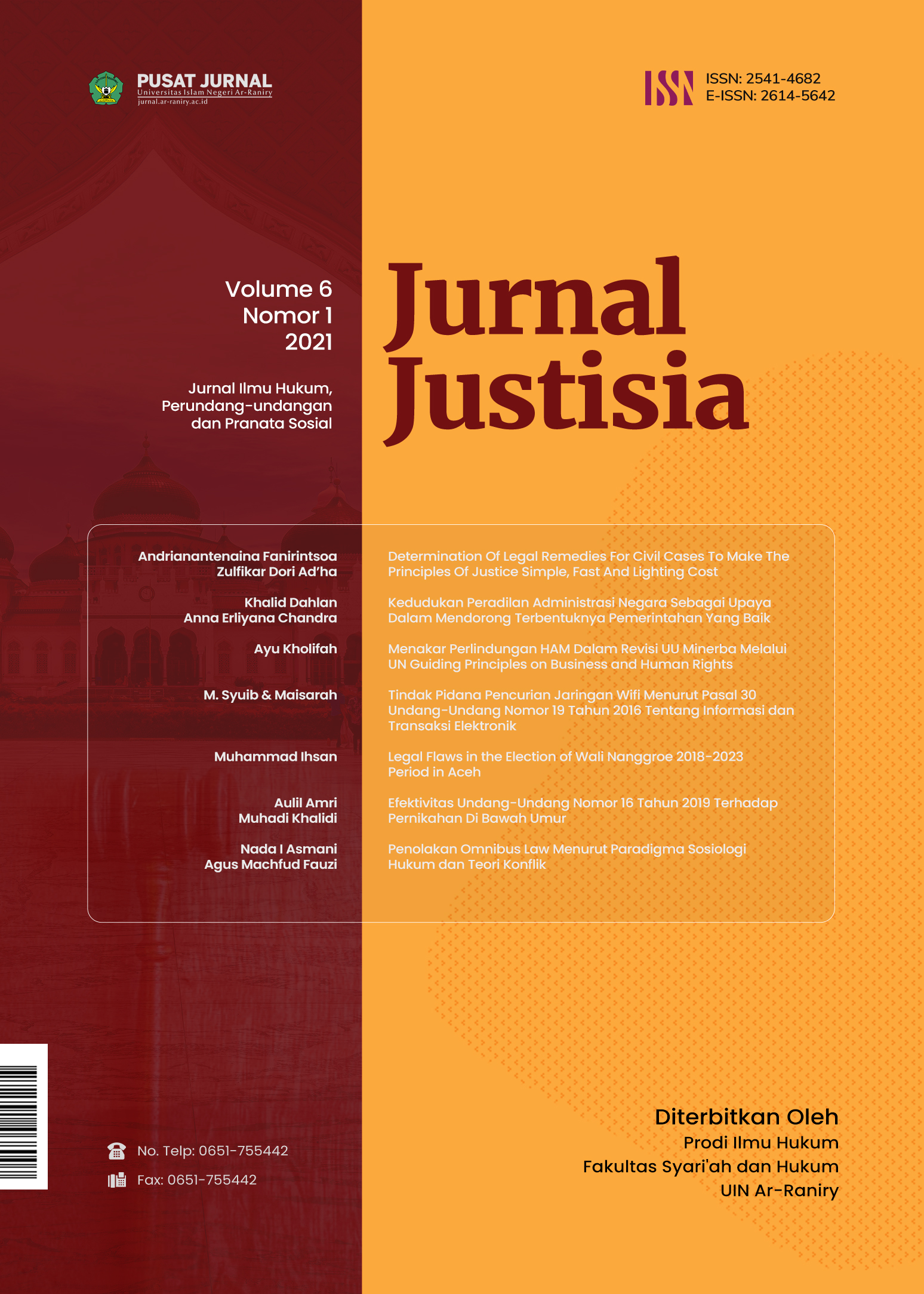Determination Of Legal Remedies For Civil Cases To Make The Principles Of Justice Simple, Fast And Lighting Cost
DOI:
https://doi.org/10.22373/justisia.v6i1.10608Abstract
One of the principles in the justice system is justice that is simple, fast and low cost. In this regard, the People's Consultative Assembly (MPR) takes this matter seriously and responds to it by issuing a decree, namely TAP MPR No. VIII/MPR/2000 concerning the Annual Report of High State Institutions at the 2000 Annual Session of the People's Consultative Assembly of the Republic of Indonesia, which one of its substances recommends that the Supreme Court immediately resolve delinquent cases by increasing the number and quality of decisions and that the Supreme Court makes regulations to limit entry cassation case. With this principle, it is necessary to conduct a study regarding the application of these principles.References
Achmad Ali, 2002, Downsides of Law in Indonesia, Causes and Solutions, Jakarta: Ghalia Indonesia, p. 78.
Ahmad Mujahidin, Reform of Civil Procedure Law of Religious Courts and Syariyah Court, Jakarta: IKAHI-MA-RI Publisher, 2008, p. 9.
Asep lwan Iriawan, Study of the Authority of the Commercial Court in Business Dispute Resolution Associated with the Principle of Legal Certainty as an Effort to Develop the Indonesian Judicial System, Dissertation, Doctor of Law Study Program, Padjadjaran University, Bandung, 2010, p. 118.
JHAPER: Vol. 1, No. 1, January-June 2015: 15–29 Latifiani: Problems in the Implementation of Judges' Decisions.
M Yahya Harahap, 2005, Civil Procedure Law, Jakarta: Sinar Grafika, p. 233.
Perma No. 2 of 2003 concerning Mediation in Courts
See Article 5 paragraph (2) Law no. 48 of 2009 jo, Articles 89 and 90 of Law no. 50 of 2009.
Soekanto, Soejono. 1983. Factors Affecting Law Enforcement. Jakarta: CV Rajawali.
Sudikno Mertokusumo, Indonesian Civil Procedure Law, Op.cit., P. 36.
Downloads
Published
Issue
Section
License
The Authors submitting a manuscript do so on the understanding that if accepted for publication, copyright of the article shall be assigned to Jurnal Justisia : Jurnal Ilmu Hukum, Perundang-undangan dan Pranata Sosial, Ar-Raniry State Islamic University, Indonesia as the publisher of the journal.
Jurnal Justisia : Jurnal Ilmu Hukum, Perundang-undangan dan Pranata Sosial right of first publication with the work simultaneously licensed under Creative Commons Attribution-ShareAlike 4.0 International License (CC BY-SA 4.0) that allows others to share (copy and redistribute the material in any medium or format) and adapt (remix, transform, and build upon the material) the work for any purpose, even commercially with an acknowledgment of the work's authorship and initial publication in Jurnal Justisia : Jurnal Ilmu Hukum, Perundang-undangan dan Pranata Sosial. Authors are able to enter into separate, additional contractual arrangements for the non-exclusive distribution of the journal's published version of the work (e.g., post it to an institutional repository or publish it in a book), with an acknowledgment of its initial publication in Jurnal Justisia : Jurnal Ilmu Hukum, Perundang-undangan dan Pranata Sosial. Authors are permitted and encouraged to post their work online (e.g., in institutional repositories or on their website) prior to and during the submission process, as it can lead to productive exchanges, as well as earlier and greater citation of published work (See The Effect of Open Access).

